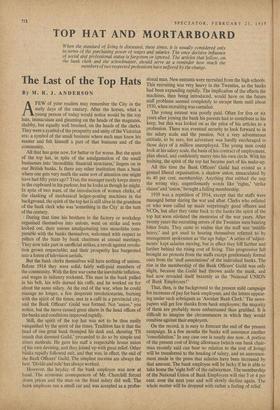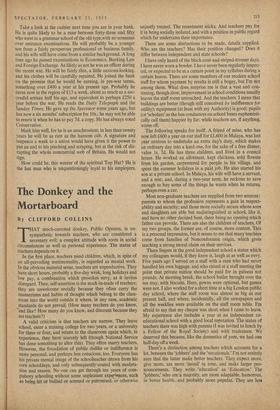TOP HAT AND MORTARBOARD
When the standard of living is discussed, these times, it is usually considered only in terms of the purchasing power of wages and salaries. The once decisive influence of social and professional status is forgotten or ignored. The articles that follow, on the bank clerk and the schoolmaster, should serve as a reminder how much the members of two respected professions have suffered by the change.
The Last of the Top Hats
By M. R. J. ANDERSON AFEW of your readers may remember the City in the early days of the century. After the horses, what a young person of today would notice would be the top hats, immaculate and gleaming on the heads of the magnates, shabby, but equally well brushed, on the heads of the clerks. They were a symbol of the prosperity and unity of the Victorian era; a symbol of the small business where each man knew his master and felt himself a part of that business and of the community.
All that has gone now, for better or for worse. But the spirit of the top hat, in spite or the amalgamation of the small businesses into 'monolithic financial structures,' lingers on in our British banks. Is there any other institution than a bank where one gets very malt the same sort of attention one might have had fifty years ago? True, the manager rarely keeps sherry in the cupboard in his parlour, but he looks as though he might. In spite of two wars, of the introduction of women clerks, of the clanking of mechanical ledger-posting machines in the background, the spirit of the top hat is still alive in the grandson of the bank clerk who was 'something in the City' at the turn of the century.
During that time his brothers in the factory or workshop organised themselves into unions, went on strike and were locked out, their unions amalgamating into monoliths com- parable with the banks themselves, welcomed with respect as pillars of the State by bank chairmen at annual meetings.
They now take part in unofficial strikes, a revolt against revolu- tion grown respectable; and their prosperity has burgeoned into a forest of television aerials.
But the bank clerks themselves will have nothing of unions. Before 1914 they were solid, fairly well-paid members of the community. With the first war came the inevitable inflation, and wages in industry rocketed. The man in the bank pulled in his belt, his wife darned his cuffs, and he worked on for about the same salary. At the end of the war, when he could manage no longer, a few desperate revolutionaries, burning with the spirit of the times, met in a caf6 in a provincial city, and the Bank Officers' Guild was formed. Not 'union,' you notice, but the move caused great alarm in the head offices of the banks and conditions improved rapidly.
Still, the spirit of the top hat was not to be thus easily vanquished by the spirit of the times. Tradition has it that the head of one great bank thumped his desk and. shouting 'I'll kinash thUt damned Guild,' proceeded to do so by simple and direct methods. He gave his staff a respectable house union sional man. New entrants were recruited from the high schools. This recruiting was very heavy in the Twenties, as the banks had been expanding rapidly. The implication of the effects the machines, then being introduced, would have on the future staff problems seemed completely to escape them until about 1930, when recruiting was curtailed.
The young entrant was poorly paid. Often for five or six years after joining the bank his parents had to contribute to his keep, but this was looked on as the price of his articles to a profession. There was eventual security to look forward to in the salary scale and the pension. Not a very adventurous attitude, to be sure, but adventure was hardly encduraged in those days of a million unemployed. The young man could look at his salary scale, the basis of his contract of employment. plan ahead, and confidently marry into his own circle. With his training, the spirit of the top hat became part of his make-up.
All this time the Bank Officers' Guild had existed as a genteel liberal organisation. a shadow union, emasculated by its 40 per cent. membership. Anything that rubbed the nap the wrong way, ungentlemanly words like `rights,' strike clause' and 'union,' brought a falling membership.
1939 was a repetition of 1914. except that the staffs were managed better during the war and after. Clerks who enlisted or who were called up made surprisingly good officers and NCOs, but after they came back to the banks the spirit of the top hat soon etiolated the memories of the war years. After twenty years the recruiting errors of the Twenties were bearing bitter fruits. They came to realise that the staff was 'middle heavy,' and got used to hearing themselves referred to by management spokesmen as 'the age bulge.' A series of 'adjust- ments' kept salaries moving, but in effect they fell farther and farther behind the rising cost of living. This progressive fall brought no protests from the staffs except gentlemanly formal ones from the 'staff associations' of the individual banks. The rise in the membership of the Bank Officers' Guild was only slight, because the Guild had thrown aside the mask, and had now revealed itself brazenly as the 'National UNION of. Bank Employees!'
That, then, is the background to the present mild campaign for increases of pay for bank employees, and the letters appear- ing under such sobriquets as 'Another Bank Clerk' The news- papers will get few thanks from bank employees; the majority of them are probably more embarrassed than gratified. It is difficult to imagine the circumstances in which they would combine against their employers. Take a look at the cashier next time you are in your bank. He is quite likely to be a man between forty-three and fifty who went to a grammar school of the old type,with no nonsense over entrance examinations. He will probably be a younger son from a fairly prosperous professional or business family, and his wife will have come from a similar background. A long time ago he passed examinations in Economics, Banking Law and Foreign Exchange. As likely as not he was an officer during the recent war. He will be fairly thin, a little anxious-looking, and his clothes will be carefully repaired. He joined the bank on the promise that he would be earning, in pre-war terms, something over £400 a year at his present age. Probably he earns now in the region of £13 a week, about as much as a suc- cessful artisan half his age, and equivalent to perhaps £250 a year before the war. He reads the Daily Telegraph and the Sunday Times. He gave up the Spectator some years ago, but has now a six months' subscription for 10s.: he may not be able to renew it when he has to pay 7d. a copy. He has always voted Conservative.
Mark him well, for he is an anachronism; in less than twenty years he will be as rare as the hansom cab. A signature and tenpence a week to a union would have given it the power to put an end to his pinching and scraping, but at the risk of dis- rupting the whole commercial web of Britain. He would not sign.
How could he, this wearer of the spiritual Top Hat? He is the last man who is unquestioningly loyal to his employers.











































 Previous page
Previous page